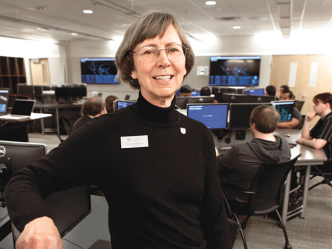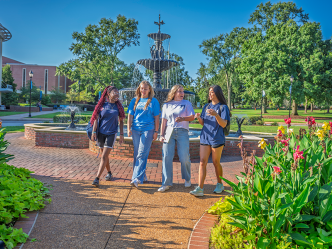Augusta University and the Department of Defense are offering two virtual, no-cost or reduced-cost computer science and cybersecurity camps for educators and students this summer to fire up interest and learning for all who participate.
Dr. Ashley Gess, assistant professor of STEAM education in the College of Education, alongside Dr. Michael Nowatkowski, associate professor with the School of Computer and Cyber Sciences, created and proposed the grant to the Department of Defense to train teachers in computer science, information technology and cybersecurity.
They created an initiative called T3C: Building Teacher Confidence in Computer Science/Cybersecurity (CS/CY).
“There are three prongs to what the initiative is really about: it’s about improving CS/CY workforce, it’s about how to get students into that workforce and how to widen the diversity of who chooses to persist in these fields,” said Gess.
As Augusta grows as a cybersecurity capital and AU expands education in cybersecurity, Gess wanted to improve teacher training so that they will be able to better educate students in computer science and cybersecurity.
“This is a tall order, because when you think about what a kindergarten teacher needs to know and what a 12th-grade teacher needs to know about computer science and cybersecurity, it’s a big difference. Our goal is to really help teachers authentically bring CS/CY into their classroom to support learning across disciplines. In order to do this, we have to help the teachers themselves become more confident in the subject matter and its potential applications,” said Gess.
Learning from other teacher trainings, Gess realized a flaw in most trainings.
“A lot of times, we bring teachers in. We say hey, let’s do this for a week. We’ll engage you, get you all fired up in June, but by the time August rolls around, they’re back in their district and they’re alone and there is no one to support them.”
The grant specifically addresses this issue by showing teachers the content and how to implement it in their classrooms. Then the initiative will continue to work with the teachers through the fall by connecting them with cybersecurity professionals, other P-12 CS/CY master teachers and AU professors.
“We’re going to intentionally work toward building a robust, vibrant, inter-district professional learning community for our participants,” said Gess.
The grant will also provide for ongoing opportunities for T3C teachers to practice what they are learning. For example, educators will be paired with P-12 colleagues who have already successfully completed coursework toward achieving an additional certification in CS/CY and together, they will design and teach a week-long virtual computer science summer camp for students entering fourth through eighth grades in fall 2021.
Additionally, every year, AU hosts STEAMIFY, a Science Technology Engineering Arts Mathematics (STEAM) design competition where teams of students work to solve real problems — problems meaningful to them, here, now. To serve T3C teachers, the event has added a dedicated CS/CY design problem for students to solve under the leadership of their teachers.
The grant will pay for the teachers’ tuition for the course, their supplies and a stipend upon successful completion of course requirements.
“What they’ll come out with is a pretty good-sized stipend per teacher, plus a graduate course toward achieving their computer science endorsement, which they can add on to their teaching certificate. The added bonus is that we are going to bring them together in a network of professionals who they can rely on even after the learning is over,” said Gess.
Teachers participating in this cyber camp can expect to learn basic computer science content knowledge, identify pre-K through 12th-grade instructional resources for teaching computer science across all subjects and align instructional resources with Georgia pre-K through 12th-grade computer science standards.
A second virtual, week-long computer science camp will be offered at a reduced cost for rising fourth- through eighth-graders.
The kids’ computer science camp integrates certified teachers, linking their various content areas with computer science, cybersecurity and informational technology.
“They’re going to be using a micro: bit to tell their COVID story and they’re going to be coding. We’re going to be teaching some of the English language arts literacy standards as well as the computer science. We are going to be educating them on how to do that safely, which is the cybersecurity component,” said Gess.
There are two options for students to log on for synchronous instruction and they will also have asynchronous follow-up work.
“By taking the content and allowing students to apply the content through a design process toward applying it to a bigger problem, that’s real. That’s when we start getting more people interested in CS and CY,” said Gess.
The kids’ cyber camp this summer takes place June 28 through July 2. The cost is $10 per day along with $17.95 for the micro: bit 2.0 GO Bundle. Students must have reliable internet access and a computer for instruction. Some scholarship opportunities are available.
For more information about applying for either opportunity, email Gess at STEAMed@augusta.edu.
 Augusta University
Augusta University




